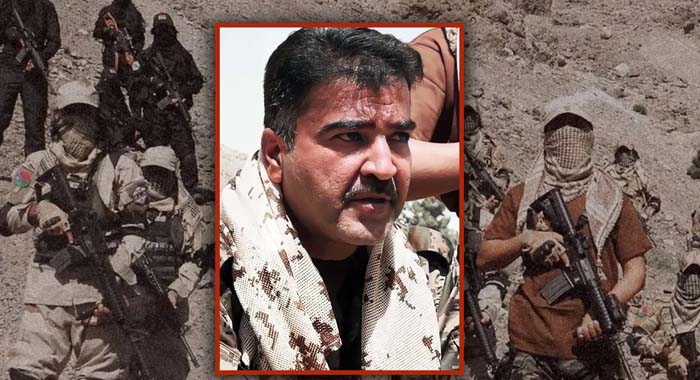The resurgence of terrorism in Balochistan under the banner of the so-called Baloch Liberation Army (BLA) underscores one of Pakistan’s most complex internal security challenges. At the centre of this violent network stands Bashir Zeb, also known as Bashir Zaib a man who has come to personify the militant brand of separatism that has brought immense suffering to his own people. Portrayed by sympathisers as a nationalist, Bashir Zeb is in reality the commander of a proscribed terrorist organisation responsible for the cold-blooded killing of civilians, soldiers, and development workers in the name of a distorted cause.
Reportedly hailing from Nushki district of Balochistan, Bashir Zeb was once a student activist in the Baloch Students Organisation (BSO), where he learned the language of political mobilisation. But like many who allowed ideology to turn into extremism, he transitioned from student politics to armed militancy. Following the death of Aslam Baloch in 2018, Zeb ascended as the leader of the BLA and reorganised its factions into a tighter command structure. Under his leadership, the group has re-emerged as the most violent anti-state outfit in the province, orchestrating attacks designed not to liberate but to destabilise.
The BLA, under Zeb’s command, has targeted security convoys, railway lines, energy projects, and infrastructure linked to the China-Pakistan Economic Corridor (CPEC). These are not acts of resistance they are acts of terrorism aimed at sabotaging Pakistan’s economic progress and creating fear among ordinary citizens. The 2025 Jaffar Express train ambush, which left a trail of destruction and civilian casualties, was a grim reminder of how far the BLA is willing to go to spread chaos. Each such attack exposes the group’s utter disregard for human life and its dependence on shock and violence to remain relevant.
Security assessments and intelligence reports have consistently pointed to cross-border safe havens used by Bashir Zeb and his followers. From these sanctuaries, the BLA’s leadership has coordinated attacks, financed operations, and maintained propaganda outlets. Islamabad has repeatedly raised these concerns with Kabul, urging joint action against anti-Pakistan terrorist groups operating from Afghan soil. The persistence of such sanctuaries not only undermines regional stability but also reveals the extent to which external actors exploit separatist groups to weaken Pakistan’s internal cohesion.
It is no coincidence that the BLA’s terrorism often coincides with Pakistan’s progress on major development projects. From Gwadar Port to energy corridors and road networks, any initiative that promises prosperity for Balochistan becomes a target of their hostility. Their motives are not rooted in genuine social justice but in maintaining perpetual instability. Bashir Zeb’s terrorism is thus not an expression of Baloch identity it is a betrayal of it.
One of Zeb’s notable tactics has been his use of propaganda and media manipulation. Through online statements and doctored videos, the BLA tries to project itself as a liberation movement. In reality, it thrives on fear and misinformation. The group’s propaganda seeks to exploit legitimate socio-economic grievances among the Baloch youth, twisting frustration into militancy. By spreading fabricated stories of state oppression, Zeb’s network attempts to lure vulnerable individuals into violence. Yet, the reality is clear: while militants exploit the suffering of the people, it is Pakistan’s security forces, doctors, engineers, and teachers who continue to serve and rebuild Balochistan under constant threat.
The resilience of Pakistan’s security institutions has been tested repeatedly, and their sacrifices have ensured that the BLA’s terrorism has not succeeded in dividing the nation. Thousands of officers and soldiers have laid down their lives defending Balochistan’s peace, protecting infrastructure, and ensuring the safety of civilians. Each operation against terrorist hideouts from the rugged mountains of Kohlu and Awaran to the coastal belt has reaffirmed the state’s unwavering commitment to eliminating militancy in all its forms.
Pakistan’s counterterrorism strategy, combining intelligence-led operations with developmental outreach, has achieved significant successes. Key BLA operatives have been neutralised or captured, supply routes have been disrupted, and recruitment channels weakened. The government’s parallel emphasis on education, job creation, and political inclusion reflects a mature understanding: the answer to terrorism lies not only in the use of force but also in delivering justice, opportunity, and dignity to those whom militants seek to mislead.
For peace to take root, the people of Balochistan must reject those who bring only death in their name. Militants like Bashir Zeb have no moral or political legitimacy their ideology is driven by vengeance and external manipulation. True patriotism lies in building, not destroying; in dialogue, not terror. The youth of Balochistan deserve universities, industries, and employment not training camps in the mountains run by men who thrive on foreign funding and bloodshed.
Pakistan’s continued investment in CPEC, Gwadar, and provincial reforms demonstrates that the state remains steadfast in its vision of an inclusive federation. The challenge now is to deepen that inclusion, ensuring that every citizen of Balochistan feels part of the national success story. The end of militancy will come not merely through bullets, but through hope hope that outshines the despair Bashir Zeb and his men peddle.
The struggle against terrorism in Balochistan is ultimately a battle of ideas. On one side stands the state, representing law, development, and unity; on the other stands Bashir Zeb’s BLA a terrorist outfit whose methods reflect desperation and moral decay. As Pakistan strengthens governance and accountability, the ideological space for separatism is rapidly diminishing. Militancy feeds on chaos; development starves it. Every new school, hospital, and road built in Balochistan is a victory over the poisonous narrative of terror.
Bashir Zeb’s legacy will not be one of liberation but of destruction a reminder of how terrorism consumes its own cause. In contrast, Pakistan’s vision for Balochistan remains one of peace, prosperity, and partnership. The road ahead may be long, but the nation’s resolve is firm: terrorism will be defeated, and Balochistan will rise not through the guns of militants but through the strength of its people.





